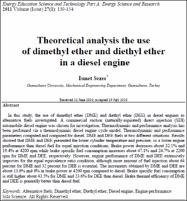Theoretical analysis the use of dimethyl ether and diethyl ether in a diesel engine

Erişim
info:eu-repo/semantics/closedAccessTarih
2011Erişim
info:eu-repo/semantics/closedAccessÜst veri
Tüm öğe kaydını gösterÖzet
In this study, the use of dimethyl ether (DME) and diethyl ether (DEE) in diesel engines as alternative fuels investigated. A commercial suction (naturally-aspirated) direct injection (SDI) automobile diesel engine was chosen for investigation. Thermodynamic and performance analysis has been performed via a thermodynamic diesel engine cycle model. Thermodynamic and performance parameters computed and compared for diesel, DME and DEE fuels at two different situations. Results showed that DME and DEE presented the lower cylinder temperature and pressure, so a lower engine performance than diesel fuel for equal injection conditions. Brake power decreases about 32.1% and 19.4% at 4200 rpm while brake specific fuel consumption increases about 47.1% and 24.7% at 2200 rpm for DME and DEE, respectively. However, engine performance of DME and DEE extensively improves for the equal equivalence ratio condition, although more amount of fuel injection about 64 percent for DME and 32 percent for DEE is essential. The increments obtained by DME and DEE are about 13.6% and 6% in brake power at 4200 rpm compared to diesel. Brake specific fuel consumption is still higher about 43.5% for DME and 23.6% for DEE than diesel. Brake thermal efficiency of DME and DEE is generally better than diesel fuel.

















